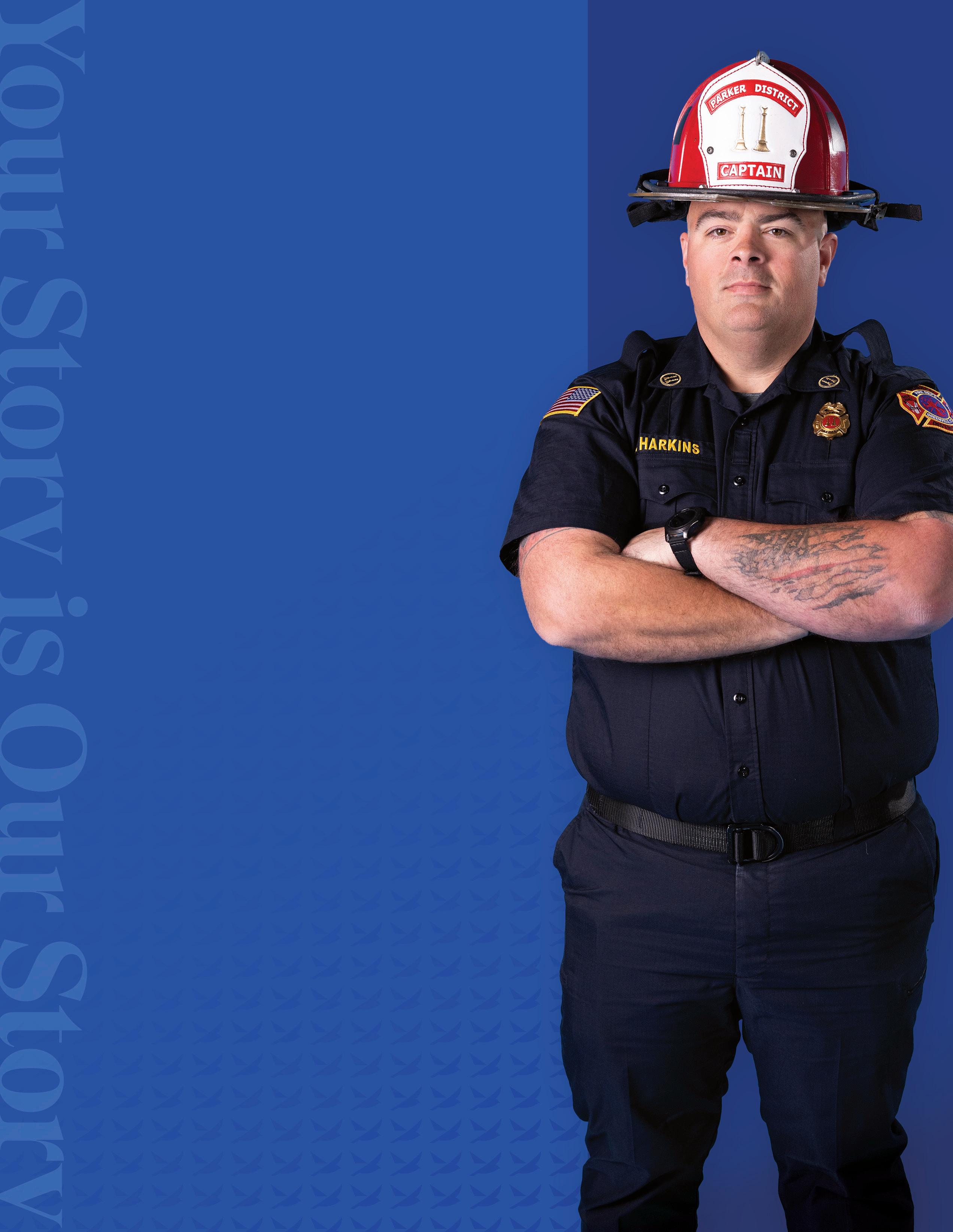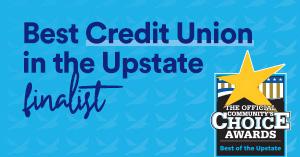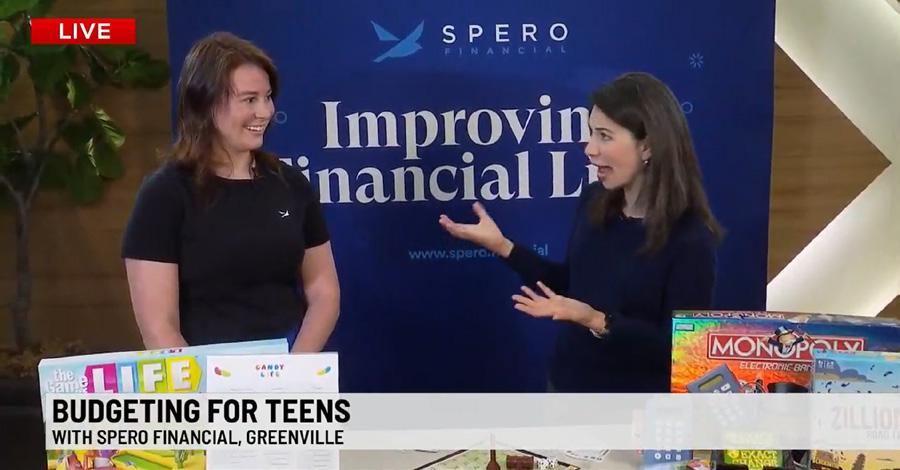




Meet Jamie. Husband, father, Spero member, and firefighter. His favorite part of his job is giving back to others. We feel the same way. We count it a privilege to help our members improve their financial lives.

“From how we used to be to now, it’s a load off my shoulders, I can’t thank them enough for how they’ve helped me along the way,” shared Jamie.
Watch Jamie’s Story.
 Brian McKay PRESIDENT
Brian McKay PRESIDENT

How can it be July already? This year is flying by! One of the things I like best about this time of year is that it’s the perfect season to recalibrate our focus. As summer wanes and school begins, we return to our daily routines, allowing us to refocus and reassess the goals we set at the beginning of the year. One goal we should pay close attention to is our financial well-being.
In the last edition of Checkpoint, we talked about financial health. While financial health is defined differently for each of us, one thing is for sure: our financial health has a direct impact on our entire well-being — mentally, physically, and socially.
According to the American Psychological Association, money is the top cause of stress in the United States. Mental health and financial wellness go hand-in-hand. In a recent Money and Mental Health Policy Institute survey, 46% of people in debt reported struggling with mental health, and almost one in five people with mental health problems said they struggle with debt.
Beyond mental health, financial challenges can adversely affect our physical health. People with poor financial health often suffer from weakened immune systems, headaches, sleep problems, and more. A 2019 Bankrate survey showed that over half of Americans lose sleep over money problems.
These statistics are heavy. I don’t share them to burden you but to showcase that focusing on financial health truly matters. We are often tempted to push financial matters aside when they become overwhelming, but doing so has a long-term impact on every aspect of our lives.
Last November, we sent our members a financial health survey. When asked about top money stressors, a majority of members listed bills, debt, emergencies, and retirement. With a mission to improve the lives of our members, we remain committed to partnering with you in every step of your financial journey. But don’t take it from me. Here’s what one of our members had to say:
“From how we used to be to now, it’s a load off my shoulders,” said Jamie, a husband, father, local firefighter, and Spero member since 2015. “I can’t thank them enough for how they’ve helped me along the way.” And this is just the start of Jamie’s story! I encourage you to watch his full story on our website.
While every situation is different, good financial health begins with knowing how to manage money effectively. This edition of Checkpoint is packed with practical ways to do just that — from tips on paying off student loans to avoiding credit card interest and more. Take a few minutes to dive in — consider it an investment in your financial health.
Lastly, a big contributor to good financial health is gratitude. It almost sounds too simple to be true, but it is. During the summer months, we are putting gratitude into action by hosting our Sweet Summer Series. We’ll be giving free frozen treats to our members at each branch as a simple way to show our appreciation for you. So, stop by and see us soon!
I appreciate you!

Financial has been named a top 3 best credit union finalist in the Greenville News Best of the Upstate Community Choice Awards. Winners will be announced on July 21!

WINNERS | Congratulations to Spero members Olivia Bonilla, Madison Bonig, and Robert Robbins for being named the recipients of Spero’s high-education scholarships. The 2023-2024 application will be available on October 2 at spero.financial/college-scholarship

Holiday Closures
KIDS AND MONEY | We joined Christine Scarpelli of WSPA Morning News to share practical and fun tips for parents to have money conversations with their kids. If you missed it, check out the tips: spero.financial/spero-financial-givesfinancial-tips-for-families.

July 4
July 17-27
SWEET SUMMER SERIES
August 17
SHRED EVENT
Follow us on social for location details spero.financial/sweetsummer-series
September 4
September 13
FACE OF RETIREMENT FREE WEBINAR
spero.financial/financialwellness-workshop
Follow us on social media at @mysperofi to see all that is happening at Spero – from community events, volunteer spotlights, financial tips, and more!

Christina Williams is a longtime Spero member who continues to stand by her statement that Spero Financial is the best banking experience she’s ever had. She loves that she’s always welcomed with warm smiles and greetings whenever she walks into a Spero branch. To her, Spero is more than just a financial institution — it’s a place full of personal connections and conversations.
“To me, financial wellness and financial security mean that I know I have a credit union that is willing to back me in times when I need financial help,” said Christina.
When she needed to rebuild her credit, Spero was there to help. “I felt hopeful,” she shared. “I knew that it would help me bring change to my credit score.”
As Christina worked with Spero to build her credit score, she understood it could serve as a lesson for her children on the importance of building and maintaining good credit.
Thinking back, Christina recalls her father bringing her into the money conversation at an early age. “My dad always taught my brother and me to save. Listening to my dad and disciplining myself to save has paid off.” Understanding the value of these early lessons, she’s done her best to pass them along to her own children.
Christina smiled as she reflected on bringing her kids into the money conversation. “This experience gave me and my family the opportunity to learn
together. I opened an account for both my son and daughter when they were teens to teach them the responsibilities of money and banking. Now they are adults, and we often compare our credit scores to see who has the highest score.”
“It feels really great to set my children up for financial success,” Christina added. Spero's resources have served as valuable tools that she and her family can use to stay financially healthy.
Through the Spero Save to Win account, she has built her savings while also winning the cash prize drawings on several occasions. “Since opening the account years ago, I’ve had the privilege to win multiple times for free cash from Spero deposited into my account. The Save to Win program is a great way to build a savings account and a chance to receive additional money as a reward for doing so!”
A lot has changed during Christina’s time with Spero, but through it all, she’s thankful that Spero continues to provide financial guidance and personal support she can count on.
To me, financial wellness and financial security mean that I know I have a credit union that is willing to back me in times when I need financial help.”
Watch Christina’s story.

While it may be easy to view different areas of life separately, it’s not always so cut and dry. Even if we may not realize it, financial wellness is critical to our overall wellness. Being financially healthy can improve our lives and help prevent hardships, but being financially unhealthy can do the exact opposite by causing stress and creating more roadblocks on our life journeys.
Below, we’ll dive into how it’s all connected and how you can take control of your financial wellness to set yourself up to be financially healthy.
Simply put, financial stress affects physical, mental, social, and emotional health. More specifically, financial stress has been known to affect sleep loss, anxiety, headaches/migraines, immune health, high blood pressure, muscle tension, heart conditions, depression, and a general feeling of being overwhelmed — among other things. According to a survey conducted by Everyday Health, finances and financial health are ranked among the highest stressors across all generations.
The impact our finances have on our health can be positive or negative, depending on how we approach our finances. It all comes down to financial literacy. Financial literacy is the thing that empowers us to become financially healthy and gives us the tools, resources, and knowledge needed to create, plan for, and achieve goals.
There are many facets to financial wellness, many of which are specific to you and your circumstances. However, a few common factors that play into financial wellness include:
One of the most significant factors of financial security is having money set aside for emergencies or unexpected expenses. Unfortunately, according to Fortune, most Americans do not have an emergency savings account, with 57% of US adults unable to afford a $1,000 unexpected expense. Regularly setting money aside to save can help you foster financial security, prepare for emergencies, and reach your goals.

Planning how to spend your money and following that plan is vital to financial health. However, according to The Penny Hoarder, over 55% of Americans do not budget or create a plan to manage their income. Knowing what money is coming in, what money is going out, and where that money is going will allow you to make adjustments and understand what changes, if any, need to take place for you to make the most of your income.
Having debt (the money you’ve borrowed) is more common now than ever. Unmanaged debt is typically an indicator of being financially unhealthy. However, all debt is not bad. Well-managed debt or credit usage can boost your credit score and increase confidence in your financial journey.
Did you know that, according to Bankrate, saving enough money for retirement is one of the biggest things that keeps people up at night? It is vital to plan financially for retirement, as most advisors agree that retirees need more than just Social Security income to live comfortably.
You don’t have to navigate your financial journey on your own. Spero makes multiple resources available to you for free, and each is extremely useful in building your financial playbook. Visit the Financial Education page on our website for access to financial insight blogs, financial calculators, and a calendar of financial workshops. We also have certified financial counselors ready to sit down with you. Schedule an appointment by visiting our website or by stopping by a branch.
According to the Education Data Initiative, the average college student spends $25,707 each year to attend an in-state school. If attending out-ofstate, this average cost increases to $44,014 per year. Even for the more affordable in-state options, this adds up to over $100,000 for a four-year degree.
With this staggering price tag, money is a big hurdle for many students pursuing higher education. Student loans make it possible for students who couldn’t afford higher education otherwise to receive an education for a future, successful career.
But just like any loan, student loans have to be paid back. So, while they enable students to earn their degrees, they can also saddle them with debt that takes years — or decades — to pay off.
Paying off student loans is a long journey. It often gets discouraging and feels never ending, but we are here to let you know that paying off your student loans is possible. With a thorough understanding of how student loans work and the right tools to pay them efficiently, you can enjoy the benefits of student loans without all the burdensome drawbacks.
Before you take out a student loan, you should understand how the various repayment plans are structured. With multiple options to choose from, student loan repayment requires strategic planning. But before we look at payments, let’s review the impact of interest on your payment.
Interest (aka the cost of borrowing the money) on student loans accrues daily or monthly. Any unpaid interest is added to the principal balance. If you only make minimum payments, you may notice the total amount you owe actually increases. This is called negative amortization. This happens because the minimum payments aren’t high enough to cover the interest accrued. In this scenario, it’s easy to see why many college graduates feel they’ll never repay their loans.
Student loan debt can be difficult to get out of, but that doesn’t mean those loans can’t be a valuable resource for students who want to get their education and are willing to pay for it later. So, if that sounds like you or someone you know, the question is: how can you get rid of student loans quickly and start accomplishing your other financial goals?
1 | MAKE EXTRA PAYMENTS TOWARD YOUR PRINCIPAL
You can make extra payments on your student loans, but it’s important to specify that any extra money should go toward your principal balance. Otherwise, lenders may put the extra money toward your next payment or move up your payment date.
You can refinance your student loan if you have good credit and a stable job. Student loan refinancing consolidates multiple loans with a single private loan. For the best terms, look for a private loan with a lower interest rate than your original loan. Word of caution: If you have a federal student loan, you may lose certain benefits such as interest rate discounts, principal rebates, or loan forgiveness benefits by consolidating. Consult your loan provider before doing so.
Autopay ensures that loan payments are made automatically on or before the designated due date. Many lenders will lower the interest rate on your student loan if you enroll in autopay because they know you won’t miss payments.

To make biweekly payments, you must be able to pay half your loan bill every two weeks. With this method, you’ll wind up making an extra payment each year, helping you pay off your student loan faster.
Earning a college degree is a powerful first step for many careers. However, before taking out student loans, consider other options that may get you there, such as a community college or applying for scholarships to help offset the financial burden of a degree. If taking out student loans is best for you, research the best programs based on your interests. For example, there are special loan programs for teaching degrees and public service. Also, take time to set your financial goals and determine how paying off your student loans fits into that. If you plan ahead and make an intentional strategy to pay them off, you’ll come out the other side financially healthy — with an accomplishment you can be proud of!
We are here to let you know that paying off your student loans is possible.
Credit cards can be a valuable resource, as many stout enticing perks such as cash back or reward points that can be redeemed for items such as plane tickets or hotels. They’re also great for larger purchases or when you need to buy something and pay it off over time. But if used unwisely, credit cards can severely damage your financial health and land you in a financial hole that’s difficult to climb out of.
A credit card is a type of loan, one that comes in the form of a plastic card. The balance on your credit card is the amount of money you’ve spent using the card — aka the amount you have borrowed to purchase the item(s). If you’re not able to pay off your credit card balance in full when it comes due, you’ll pay interest on your remaining balance. Interest is the “cost” of borrowing the money. Over time, the amount you owe will continue increasing if you can’t get on top of your payments. This is because your balance carries over month to month, meaning you pay interest on interest.
High levels of credit card debt negatively impact your credit score. As your credit card debt goes up, not only do the payments get harder to keep up with, but your credit utilization ratio also increases. This ratio is the percentage of your total available credit that is being used. It is a key contributor to a healthy credit score.
Ultimately, the best way to minimize credit card interest is to avoid it altogether. You can do this by paying your bill on time and in full, exploring no-interest options, transferring balances, and taking advantage of your grace period.

Avoiding credit card interest is a practical financial strategy that can generate significant savings. Here are a few credit management tips to consider:
The most straightforward way to avoid credit card interest is to pay your entire balance each month. Do this by resisting the urge to purchase something you won’t be able to pay off in a reasonable time frame. Also, monitor your card usage closely to ensure you’re sticking to your budget. Unexpected life events often cause a hiccup in this plan. That’s why it’s important to create an emergency savings account to proactively tackle unexpected financial challenges when they occur. (Because they will!)

Balance transfer offers allow you to transfer balances from other credit card accounts to a new card with 0% interest, typically for 12 to 21 months. They are an excellent option for those dedicated to paying off credit card debt as quickly as possible.
Planning big purchases makes it easier to schedule them for times in your billing cycle that give you more time to pay off the balance before interest accrues. Planning also lets you budget out how you will pay the balance.
A grace period is the time a lender gives you to pay off a balance before charging you interest. It falls between the time a billing cycle closes and the due date for the payment. If you fail to pay your balance before the grace period ends, the unpaid balance will begin to accrue interest based on your card’s annual percentage rate (APR).
If you make big purchases at the beginning of a billing cycle, you’ll have the entire billing cycle plus the grace period to pay off that purchase. But if you’re going to use this strategy, it’s important to follow a budget that includes regular credit card payments. You can make multiple payments throughout the month or one large payment, but either way, make sure you have the funds to pay off whatever balance you owe each month.
If you cannot pay your balance by the due date, you will lose the grace period on your credit card. Fortunately, many credit issuers reinstate grace periods after you complete a few billing cycles with on-time payments and no longer carry a balance.
As we’ve said before, credit cards aren’t bad, but if used unwisely, they can hurt more than help. Be intentional with how you use your credit cards, and remember — it’s always easier to avoid interest than it is to pay it off.
We live in a world where social media can be found in almost everyone’s back pocket.
With over 243 million Facebook users in the United States alone, social media has played a large part in building a world that’s more connected than ever. But that might affect more than we realize — even our wallets.

So, how does social media affect our spending habits? Let’s explore these five ways:

Social media has many positive impacts, but one of its downfalls is that many users only post "instaworthy" content. While not intentional, this habit tempts us to view our world through an unrealistic lens — comparing our daily lives with others.
Often without realizing it, we find ourselves purchasing things we see others have on social media in an attempt to make their reality our reality. So, be cautious about comparing your life with the life of someone you see on social media. Doing so can have major impacts on your wallet.
Everyone has the ability to create and publish essentially anything they want to. With social media becoming the newest search engine, people are heading to their favorite feeds to research and find information.
While there is some excellent financial education information available on social platforms, there is also bad financial education out there. Be cautious when taking advice from random content creators, and always fact-check any advice or information they may share.
social media, purchasing through a social platform is easier than ever.
Always think twice before hitting the “Confirm Purchase” button. Review your budget to ensure you stay focused on the money goals you set for yourself.
The rise of Buy Now, Pay Later platforms enables and encourages you to spend more money than you might have. These platforms allow you to break an online purchase down into multiple payments instead of paying the full amount at the time of purchase — and they often pop up during the checkout process.
While these payment plans seem like a great idea, they may give you the comfort needed to spend more money than you have, as the immediate cost is much lower than the item's total price. Always remember that there will be real payments with real due dates, and if you’re unable to make those payments on time, it will affect your credit score.
These days, social media isn’t just a way to see photos and status updates from friends and family; it’s a full-fledged commerce platform. With online marketplaces and stores specifically designed for
Social media platforms have some powerful advertising capabilities! These targeted ads are found throughout your feed, and they’ve become extremely effective, as they tend to be very specific and show you products you’re in the market for or interested in.
While you can’t eliminate all ads, staying intentional with purchases and keeping your budget top-of-mind is important to prevent unnecessary spending.
Social media isn’t all bad, but some aspects of the platforms may affect how you think about — and ultimately spend — your hard-earned money. Remember that there’s more to life than fancy dinners, luxurious trips, and all good all the time. Reminding yourself of this truth can prevent comparison and a compromised budget. As you scroll, keep your budget and your goals in mind to avoid unnecessary spending and impulse purchases.
PO Box 10708
Greenville, SC 29603
www.spero.financial
